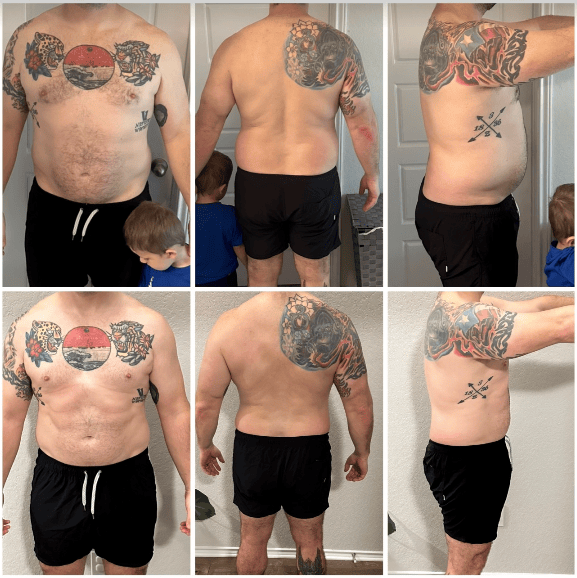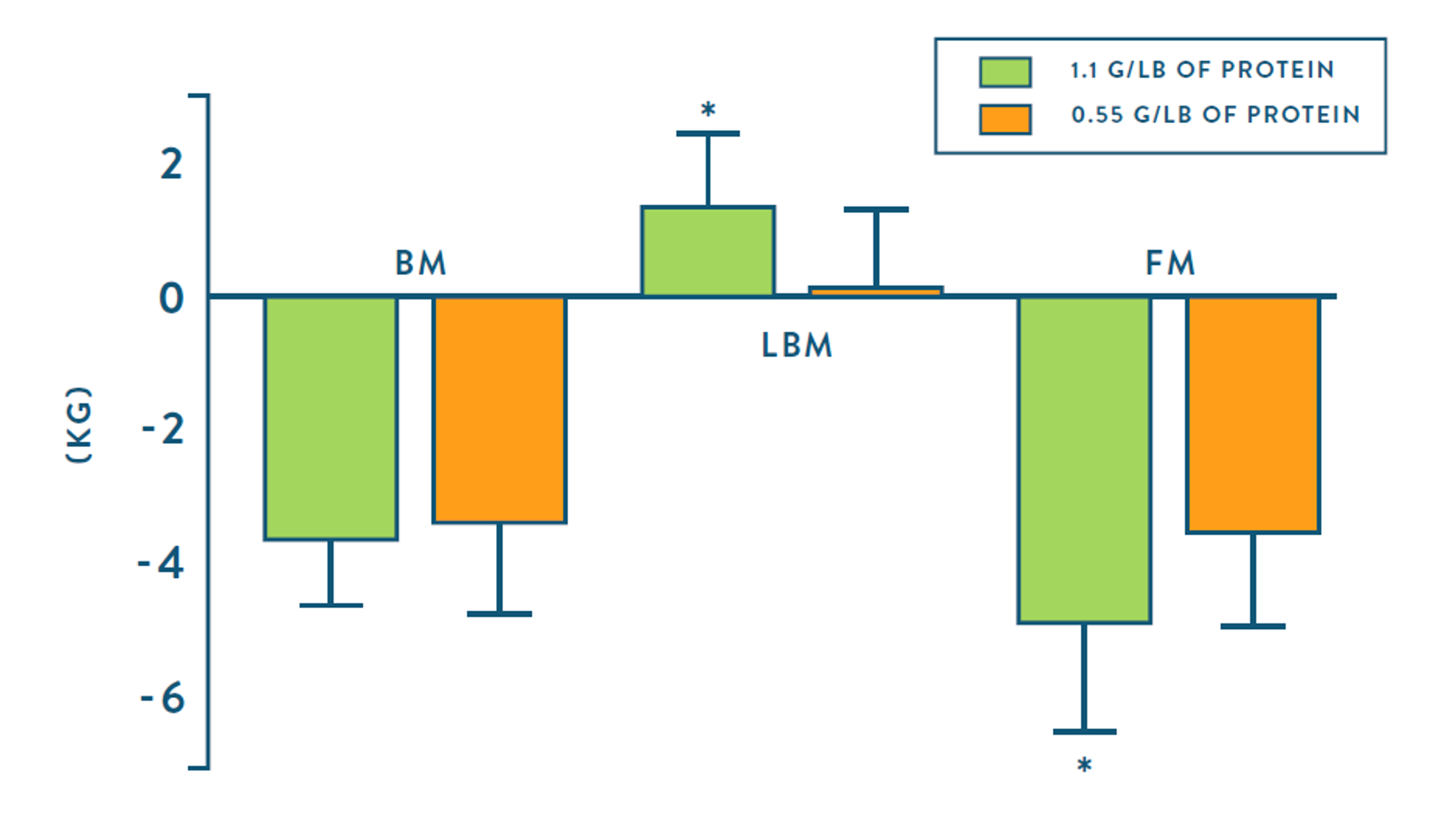With substantial effort, losing fat while Gaining Muscle at the same time is possible in both males and females [1-7].
This is called Body Recomposition, or Recomping.
The most relevant Recomp research for most people is the 2016 Longland et al., study out of McMaster University [3]. This study was 4 weeks long and put subjects at a 40% caloric deficit. These individuals also performed 3 days of circuit training and 3 days of cardio per week, while maintaining an average of 11,915 steps per day.
The group eating 0.55g/lb of protein group stayed the same on Lean Body Mass and lost 7.7 lbs of Fat. With this level of exercise and movement, the group eating 1.1 g/lb of protein, gained 2.6 lbs of Lean Body Mass and lost 10.5 lbs of Fat in just 4 weeks! This is nearly DOUBLE the amount of recompositioned mass when compared to the low protein group!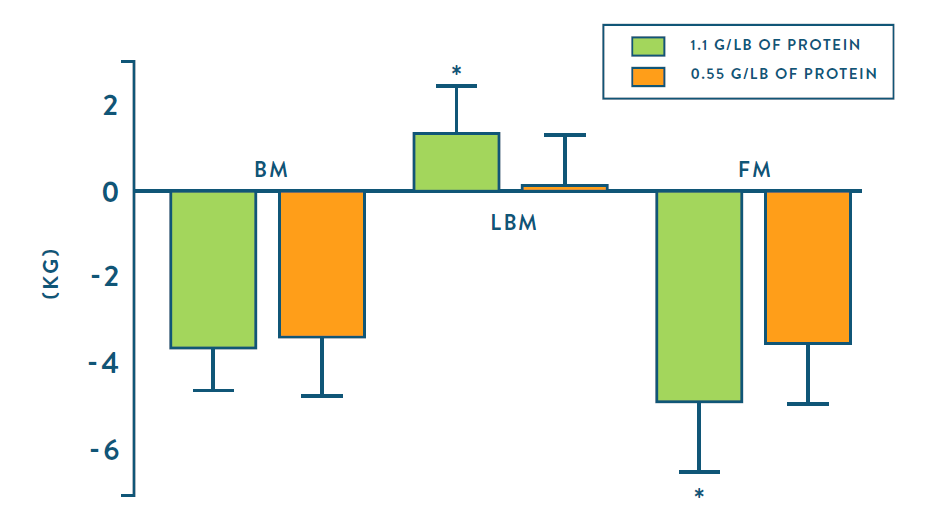
Adapted four compartment body composition data from Longland et al., 2016 [3]
Just in case you missed it, let’s read that again.
The High Protein + Exercise Group gained 2.6 lbs of Lean Body Mass and lost 10.5 lbs of Fat in just 4 weeks.
The key to these results is the Exercise and Resistance Training first, and then the increased protein intake seems to support that training stimulus.
For example, Backx et al., [8] induced weight loss WITHOUT exercise at only a 25% caloric deficit for 12 weeks, and both the high (0.8 g/lb) and low protein (0.4 g/lb) groups lost ~20 pounds in three months.
BUT, 4.5 of those pounds were MUSCLE regardless of how much protein they ate! This is in line with the research showing that when dieting without exercise, the weight you lose will likely be 22-35% muscle no matter what you do with your nutrition [9, 10]!
SADNESS!!!
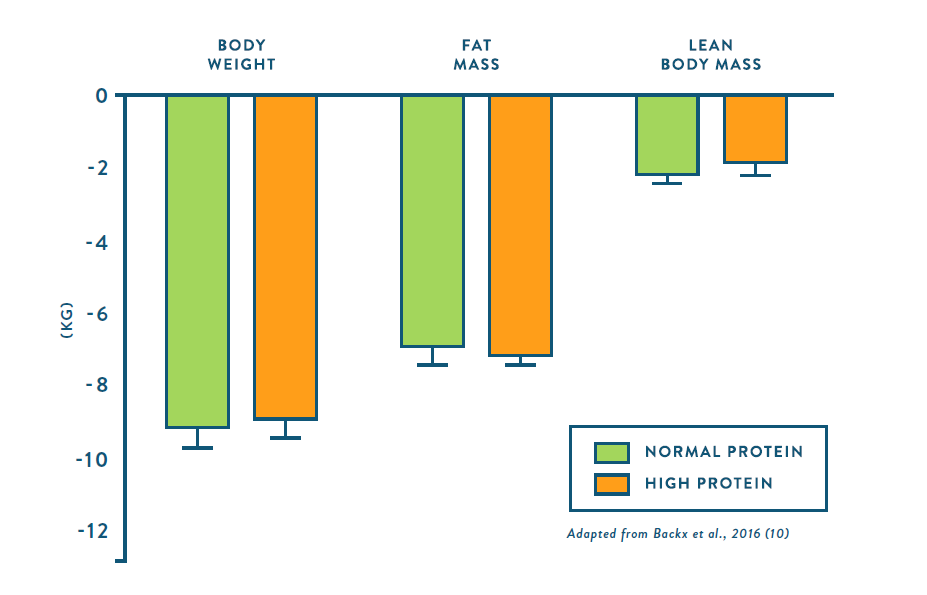
The figure above is adapted from Backx et al., 2016 [8]. This study showed that a higher protein intake of ~0.8 grams per pound did not increase lean body mass retention during weight loss.
We can't let this happen to you, and this is why resistance training and getting people moving are so important to My Fit Foods.
Furthermore, for fat loss, diet plus exercise looks to be even more effective than diet alone, and diet without exercise with the likely muscle loss just isn’t really an ethical option [11].
So, come into the store! Let’s find an exercise regimen you love and get you the protein and food you need to meet your goals!
#GIVEAFIT
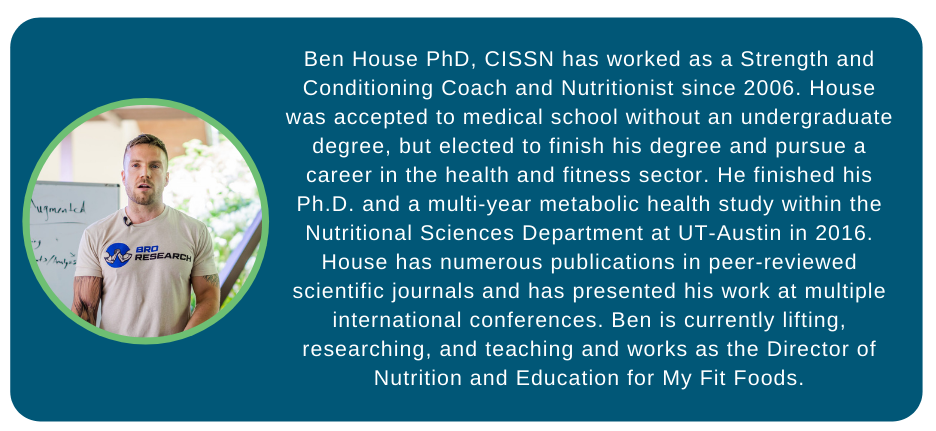
**Overly Nerdy Scientific Nuance from the Longland et al., Study - the two groups were calorie and carbohydrate equated, thus they dropped the fat of the Higher Protein group by a lot (38 grams total), so this group likely had less useable energy than the Low Protein group (at 86 grams of Fat). Although, the individuals in the High Protein group may have, and likely were, utilizing their own body fat to fuel muscle growth to some degree. They were likely in a more significant deficit, given the inefficiency of turning excess protein into oxidizable fuel.
REFERENCES:
1. Rauch, J.T., et al., Similar Strength and Power Adaptations between Two Different Velocity-Based Training Regimens in Collegiate Female Volleyball Players. Sports (Basel), 2018. 6(4).
2. Haun, C.T., et al., Effects of Graded Whey Supplementation During Extreme-Volume Resistance Training. Front Nutr, 2018. 5: p. 84.
3. Longland, T.M., et al., Higher compared with lower dietary protein during an energy deficit combined with intense exercise promotes greater lean mass gain and fat mass loss: a randomized trial. Am J Clin Nutr, 2016. 103(3): p. 738-46.
4. Campbell, B.I., et al., Effects of High Versus Low Protein Intake on Body Composition and Maximal Strength in Aspiring Female Physique Athletes Engaging in an 8-Week Resistance Training Program. Int J Sport Nutr Exerc Metab, 2018. 28(6): p. 580-585.
5. Barakat, C., et al., Body Recomposition: Can Trained Individuals Build Muscle and Lose Fat at the Same Time? Journal of Strength and Conditioning Research, 2020. 42(5): p. 7-21.
6. Josse, A.R., et al., Increased consumption of dairy foods and protein during diet- and exercise-induced weight loss promotes fat mass loss and lean mass gain in overweight and obese premenopausal women. J Nutr, 2011. 141(9): p. 1626-34.
7. Hunter, G.R., et al., Resistance training increases total energy expenditure and free-living physical activity in older adults. J Appl Physiol (1985), 2000. 89(3): p. 977-84.
8. Backx, E.M., et al., Protein intake and lean body mass preservation during energy intake restriction in overweight older adults. Int J Obes (Lond), 2016. 40(2): p. 299-304.
9. Heymsfield, S.B., et al., Weight loss composition is one-fourth fat-free mass: a critical review and critique of this widely cited rule. Obes Rev, 2014. 15(4): p. 310-21.
10. Cava, E., N.C. Yeat, and B. Mittendorfer, Preserving Healthy Muscle during Weight Loss. Adv Nutr, 2017. 8(3): p. 511-519.
11. Clark, J.E., Diet, exercise or diet with exercise: comparing the effectiveness of treatment options for weight-loss and changes in fitness for adults (18-65 years old) who are overfat, or obese; systematic review and meta-analysis. J Diabetes Metab Disord, 2015. 14: p. 31.
About Author: Mario Mendias


